Juiz de Fora Brazil, Vale dos Guedes Project, Horizontes Arquitetura, Community Design Brasil
Juiz de Fora, Brazil : Informal Communities
Vale dos Guedes Project – design by Fernando Lara + Horizontes Arquitetura
page updated 30 Jul 2016 ; 11 Mar 2011
Juiz de Fora, Brazil
Fernando Lara + Horizontes Arquitetura
Juiz de Fora, Brazil
The informal community called Vale dos Guedes in the city of Juiz de Fora, Brazil, presents a unique opportunity to a design project that can become a reference in sustainable low cost urbanization. All over Brazil informal settlements have grown exponentially over the past 50 years, now requiring huge investments in sanitation and accessibility.
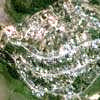
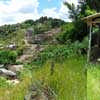
Vale dos Guedes images from architects
Vale dos Guedes is still in early stages of consolidation, allowing us to intervene more effectively (and less costly) to provide not only infrastructure but also to implement a sustainable urbanization, both from a social and an environment standpoint. Vale dos Guedes presents the greatest challenge for urbanization in the twenty-first century: a self-regulated and healthy community, with basic infrastructure combined with flexibility for incremental growth. Basically: to use the best of the informal process and the economies of scale and quality assurance of the formal processes.
The current condition shows a low-density occupation, with great potential for consolidation. However, the steep topography means that a large part of the area is too risky to build. With those parameters we thought that density should not surpass 100 inhabitants per hectare. Such can be done with the demarcation of certain areas for expansion and certain areas for preservation, with cultivation backyards working as buffer between them. We also designed prototypical houses that can be adapted to diverse sites conditions and that incorporate incremental growth in the future.
None of this can be achieved with intense community participation. The agency to change your own house is fundamental for adaptability and reliance in low-income communities. Community participation in the planting and maintenance of park areas make them co-responsible. Encouraging the use of fruit trees in backyards and public areas has an impact on food security and income for the poorest.
A major problem of informal settlements is the total absence of public space resulting from the uncontrolled density. And the public space is the key agent for community formation, allowing recreational activities, festivals and gatherings that promote the simple idea of collective rights and responsibilities. From high-traffic grass to fruit trees and preserved woods, the idea is to lead by example, with neighbors and construction workers absorbing concepts to be applied in their own homes.
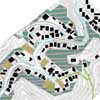
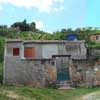
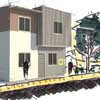
Vale dos Guedes images from architects
Any sustainable intervention in low income areas must take into account the need for change and. The opportunity of improving infrastructure before densification means that we can get the best out of public investment and the best out of self-construction. Every low-income community has a large number of construction workers. To hire from that very same community has many advantages: it enhances the ties between the project and the inhabitants, generate income, and serves as job training.
This year we will break a sad record in Brazil with more than 1000 people dead as result of flooding, the majority of them in informal settlements. At Vale dos Guedes we will improve the infrastructure without the side effect of low permeability. Using permeable paving as much as possible, reducing the amount of rainfall to be captured by the storm-water system and increasing rainfall infiltration into the soil which is good for the vegetation and evaporation and helps balance the temperature in the days after the rain. We will also demarcate all areas of steep incline and flood plain as non-building, working with intense community participation to enforce such boundaries. And finally, the project contemplates a productive buffer of fruit-tree orchards between the housing and the natural reserves, enhancing food security and supporting wildlife.
In summary, Vale dos Guedes has the potential to be the first sustainable informal settlement in Brazil.
Vale dos Guedes Juiz de Fora images / information from Horizontes Arquitetura
Location: Juiz de Fora, Brazil
Brazil Architecture
American Architecture Walking Tours : city walks by e-architect
Brazil Architecture Design – chronological list
Brazilian Community Architecture – Selection
Brazilian Architecture – Selection
Image and Audio Museum, Rio de Janeiro
Diller Scofidio + Renfro
Museu da Imagen e de Som
Cidade da Musica Roberto Marinho, Rio de Janeiro
Atelier Christian de Portzamparc
Cidade da Musica : Brazilian concert hall building
Deodoro Shooting Center, Rio de Janeiro
BCMF Arquitetos
Deodoro Shooting Center
Porto Alegre House : Slice House
Comments / photos for the Juiz de Fora Architecture page welcome
